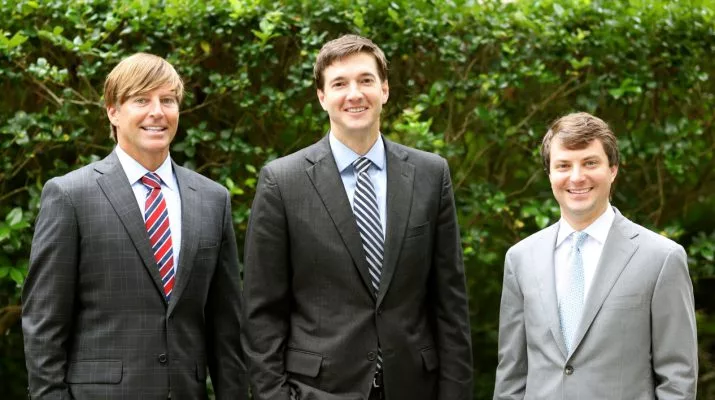Frequently Asked Questions
About Motorcycle AccidentsCharleston motorcycle accident cases can become complex, from determining all potentially liable parties to finding admissible evidence that will support your case. Insurance companies will fight to payout motorcycle accident victims the compensation they need and deserve. Whether you suffered serious harm or you lost a loved one, taking immediate action is essential for your case.
Neither time nor insurance companies are on your side. The sooner you schedule a free case evaluation, the faster a Charleston motorcycle lawyer can get to work for you.
A serious motorcycle accident is a tragic event that changes everything for victims. If you were injured or lost a loved one in a Charleston motorcycle accident, pursue justice with the help of a Charleston motorcycle accident lawyer.
Most Charleston motorcycle accident cases settle without ever going to trial. In some cases, though, your case may need to go before a judge or jury before you can recover compensation.
Your lawyer can apply their experience and negotiation skills to fighting insurance companies for a fair settlement. Many insurance companies do not want the cost and time of a trial and work to settle the case out-of-court.
However, if an insurance company is reluctant to settle for what you deserve, your lawyer may recommend proceeding through the court system. A personal injury or wrongful death lawsuit must be filed with the court by a hard deadline, referred to as the statute of limitations. Failure to adhere to the statute of limitations can forfeit your opportunity to recover compensation.
The tragic loss of a loved one in a motorcycle accident is something no amount of money can replace. However, pursuing compensation is possible with a Charleston wrongful death lawyer by your side.
A wrongful death action allows you to seek compensation for the expenses and impacts you’ve suffered as a result of losing your loved one in a motorcycle accident.
Who may bring a Charleston wrongful death action is dictated by South Carolina law, which specifies that the executor or administrator of the deceased’s estate must bring the action. However, who qualifies for compensation involves a pool of the decedent’s relatives. Examples of qualifying relationships include a surviving spouse, parents, or children.
The types of damages possible in a wrongful death action depend upon the facts of the case, but typically include:
- Funeral expenses;
- Final medical costs for your loved one;
- Loss of income your partner provided;
- Loss of inheritance for children;
- Loss of companionship.
You can learn more about how to proceed with a wrongful death action by scheduling a free case consultation with a Charleston motorcycle accident attorney.
Hiring our Charleston motorcycle accident attorneys is affordable because of how we arrange payment for legal fees. We operate on a contingency fee basis. This means our legal fee is contingent, or depends, upon the success of your case.
We only collect our fee if we secure compensation for you. If we do not win, you do not pay. To learn about the specifics of our fee arrangement, contact us for a free case consultation.
Yes. However, it is not advisable to accept a settlement without at least first consulting with a lawyer. Doing so places you at risk of leaving money you deserve on the table, and facing future financial difficulty as you discover expenses the settlement amount is insufficient to cover.
Once you accept their settlement offer, your case is closed. The amount the insurance company first offers you is typically not enough to cover future medical care you may need, should your condition worsen.
Insurance adjusters tend to aggressively pressure you into a settlement. The experience of a traumatic motorcycle crash requires you to focus on rest and recovery. Instead of having to deal with an insurance company on top of it all, you’re better off hiring an attorney to take care of that for you.
A serious motorcycle accident disrupts your entire life and impacts more than your physical health. A lengthy recovery or a permanent injury can prevent you from returning to your work or many of the activities in your personal life.
Reduced or total loss of income can cause you great anxiety as the medical bills begin to arrive.
In addition to your medical costs, a motorcycle accident attorney typically fights to recover compensation for:
- Lost income;
- Loss of future earning capacity;
- Pain and suffering;
- Emotional and mental trauma.
While harder to quantify, the mental and emotional anguish you experience due to your accident demands justice. Post-traumatic stress disorder (PTSD) is just one potential mental issue many accident victims deal with following a motorcycle accident.
The facts of every motorcycle accident differ in terms of responsibility, types of injuries, and more. Because of this, you can’t tell what compensation you might be entitled to in your case until you consult an attorney. And, while your attorney cannot promise any specific outcome, they can give you the best chance of recovering the compensation you deserve.
A severe motorcycle accident injury can forever impact your quality of life in many different ways. Motorcycle accident injuries vary; however, the following are some of the more serious, though common, injuries, which place motorcyclists at risk for never riding again:
Traumatic Brain Injury. The Centers for Disease Control (CDC) observes that a brain injury results from a bump, blow, or jolt to the head or penetrating injury that can disrupt normal brain function. Clearly, if you get hit while on a motorcycle, you’re at risk of such injury. With South Carolina helmet laws only applying to those younger than 21 years old, the risk for a TBI is even higher for those who ride helmetless.
A severe brain injury may require more care than a family can provide. And placing a loved one in a skilled nursing facility is not an easy decision. However, a skilled facility can provide the care they need—though, at a cost. The average cost of a skilled nursing facility is thousands of dollars per month.
When a motorcyclist sustains a brain injury from an accident caused by another driver, that driver should pay costs relating to your loved one’s care. A skilled Charleston motorcycle accident injury lawyer can help you hold them accountable for your loved one’s damages.
Spinal Cord Injury. Motorcyclists also face a high risk of spinal cord injuries in an accident. A spinal cord injury typically results in some form of paralysis, forever changing a victim’s life. Such victims might require the assistance of a power chair, along with home modifications to accommodate the chair. In addition, accessible transportation and other necessities are important for improving a patient’s quality of life.
Assistive equipment like power chairs and accessible vans or cars need replacing throughout the patient’s lifetime. The Christopher and Dana Reeve Foundation reports that the lifetime costs can easily reach millions of dollars. If you sustain a spinal cord injury from the wrongdoing of another, they should have to pay for your costs.
Other Injuries. Other serious injuries stemming from motorcycle accidents and resulting in extensive medical bills include internal bleeding, severe road rash, and broken bones. Many motorcyclists experience more than one injury, making the ability to afford sufficient and high-quality medical care imperative.
The long-term costs of serious injuries are part of what a lawyer will pursue in a motorcycle accident injury case. Exploring how a Charleston motorcycle accident injury lawyer can help you often takes just a phone call or online form submission. The easy contact process can start your journey toward the best outcome possible.
The driver responsible for your accident injuries may try to blame you for the accident. To protect your best interests, it is best not to speak with them after the accident and to reach out to a personal injury lawyer as soon as possible.
Any evidence relating to your accident can help your lawyer determine liability.
This evidence generally helps in Charleston motorcycle accident cases:
- Police reports: An official police report from the scene often notes important details regarding driver fault and charges.
- Eyewitness contact information: You might connect with witnesses at the scene, and the police report might include witness information as well. Your lawyer will likely want to interview them, and may later call them to testify in support of your case.
- Documentation of the accident scene: Photographs of the accident scene may provide important details previously overlooked by police.
- Medical records: These provide information regarding the severity of your injuries and the costs to treat them, which is essential for pursuing full compensation.
- Proof of lost wages: Documentation of the income you lost while in recovery is also important to ensure you demand the full compensation you deserve.
These are just some examples of the types of evidence that can help your lawyer build your case. Your lawyer can use this information to identify those liable for your harm and to determine the full extent of your damages.
The National Highway Safety Administration (NHTSA), highlights a few core causes of motorcycle accidents, revolving around the negligence of another driver. Too often, a driver who hits a motorcyclist will say that they did not see the motorcycle.
Failure to watch for motorcycles can happen when a driver:
- Fails to adjust their mirrors: most of the area surrounding a vehicle contains blind spots, in which motorcycles are even more concealed, making mirror adjustment crucial for safety;
- Ignores the motorcycle operator’s right of way: turning left in front of a motorcycle often results in tragic crashes;
- Neglects to properly judge the distance and speed of an approaching motorcycle before entering a roadway.
These are just a few examples of driver negligence that can forever change the life of a motorcyclist.
Drivers may also cause motorcycle accidents by engaging in the following types of especially reckless behaviors behind the wheel:
- Driving under the influence of drugs and/or alcohol: Despite the known dangers of drunk or drugged driving, drivers continue to take risks along Charleston streets and highways. The South Carolina Department of Public Safety reports that nearly half of all fatal accidents in South Carolina involve an impaired driver.
- Driving distracted: The Centers for Disease Control (CDC) identifies three main forms of distraction: visual, manual, and cognitive. Drivers who take their eyes off the road, their hands off the wheel, or their minds off driving place motorcyclists at risk for serious harm. Motorcyclists can be hard to notice, even motorists with their full attention on the road.
- Aggressive driving: Purposely tailgating, speeding, or cutting off a motorcyclist in traffic are examples of aggressive driving. This dangerous form of driving can develop into road rage, placing motorcyclists in extreme danger for serious injuries.
- Drowsy driving: Failure of a motorist to rest or driving with an undiagnosed sleep disorder can lead to accidents caused by drowsy driving. The Sleep Foundation notes the similarity of the effects of drowsy driving to the impairments caused by drunk driving.
Charleston residents and visitors must always drive carefully and obey traffic laws. If the driver responsible for your motorcycle accident acted negligently or broke traffic laws and got into a wreck with a motorcycle, they may face liability.
A motorcycle provides almost no protection in a truck or car collision. The gear you wear and how defensively you operate your bike can only do so much to protect you in a traumatic crash. If you’ve done all you can to avoid a crash, and are nonetheless injured due to another motorist’s wrongdoing, you deserve to recover compensation for your injuries.
As reported in 2017 by The Post and Courier, South Carolina is one of the deadliest states in the southeast for motorcyclists. While many different reasons account for this deadly ranking, both motorcyclists and state officials are unsure of how to reduce the state’s death rates. Consider the following statewide accident statistics for more information.
The Numbers
The Post and Courier article notes that South Carolina’s average annual death rate for motorcyclists from 2011 to 2015 was 10 deaths for every 10,000 motorcycles, which placed the state second only to Mississippi in a comparison of the motorcyclist fatality rates across nine southeastern states. Mississippi has the least number of motorcycles of all of the nine states included in the study, which may explain that state’s high average.
Below we discuss some more statistics provided by the South Carolina Department of Public Safety using 2017 data:
- South Carolina experienced 116 fatal motorcycle accidents in 2017, a decrease of 23 accidents from the year before, after two years of increases. Sadly, these accidents resulted in 117 deaths.
- During 2017, South Carolina experienced 1,693 motorcycle accidents that involved injuries, with a total of 1,996 injured individuals.
- In a five-year time from 2013 to 2017, South Carolina experienced 597 fatal motorcycle collisions and 8,247 motorcycle accidents that involved injuries. The deadliest year during that time period was 2016, with 148 deaths in 139 fatal collisions.
- Men accounted for nearly 86 percent of all motorcyclists involved in accidents in 2017. Female motorcyclists only accounted for 9 of the 117 fatal motorcycle accidents during the same year.
- Actions by the motorcyclists contributed to more than 54 percent of the fatalities, injuries, and property damage that occurred in motorcycle accidents in 2017, including in 81 fatal accidents. Other factors unrelated to the motorcyclists’ actions caused 41 of the fatal accidents.
- In 2017, South Carolina had 115,143 registered motorcycles—down slightly from the year before. The motorcycle collision rate for registered motorcycles was 2 accidents out of every 100 registered motorcycles.
- In a ten-year time frame from 2008 to 2017, there were only three years that had less than one hundred fatal motorcycle collisions; there were 95 fatal motorcycle collisions in 2009, 84 in 2010, and 89 in 2014.
- 2014 featured the lowest fatality rate for motorcyclists in the past five years, with a rate of slightly less than eight fatal motorcycle accidents for every 10,000 registered motorcycles.
- In 2017, the most motorcycle accidents occurred on secondary roads, with 778 total collisions occurring on such roads, including 45 fatal accidents and 580 injury collisions.
State Laws Involving Motorcyclists
The Post and Courier article included a discussion of these unique characteristics of South Carolina laws that pertain to motorcyclists:
- South Carolina law only requires motorcyclists that are 20 years old or younger to wear helmets. Research suggests that if the law required motorcyclists of all ages to wear helmets, the state’s death rate could potentially drop by as much as 42 percent. Laws in the 19 states and the District of Columbia require the use of a helmet while riding a motorcycle; in these places, motorcyclist death rates are 20 to 40 percent lower when compared to states without such laws.
- The state allows motorcyclists to obtain licenses without any formal training and little proof of road proficiency. The state’s motorcycle laws only require written and vision tests, along with the choice of either proof of a safety education course or a road skills test that the individual takes on a closed course at speeds of around 15 miles per hour.
Time of Day and Year
The time and date often play a role in motorcycle accidents. According to the South Carolina Department of Public Safety:
- May was 2017’s most dangerous month, with 322 total motorcycle collisions, including 12 accidents with fatalities, 250 with injuries, and 60 with just property damage. 297 individuals sustained injuries in motorcycle accidents in May.
- September was the deadliest month of 2017, with 17 fatal motorcycle accidents resulting in the deaths of 17 people.
December was the safest month of 2017 for motorcyclists, with 80 total collisions that involved 3 fatal accidents and 65 accidents with injuries, resulting in injuries to 82 people. - 490 of the state’s motorcycle accidents occurred on a Saturday, making that the single most dangerous day for motorcyclists. Saturdays were also the deadliest day of the week, with 33 fatal collisions happening on Saturdays in 2017. Saturday accidents accounted for injuries to 463 people.
- The safest day of the week for motorcyclists in 2017 was Monday; however, 228 total collisions, including 9 fatal accidents and 177 injury accidents, still occurred on Mondays.
- In 2017, the most dangerous time of day for motorcyclists in terms of being involved in an accident was the late afternoon to evening hours of 3 to 6 pm. During that time of day, there were 594 total collisions, including 21 fatal accidents and 447 accidents that involved injuries.
- Nighttime hours between 6 p.m. and midnight represented the deadliest time of day for motorcyclists, with 33 fatal accidents occurring between 6 and 9 p.m. and another 27 between 9 p.m. and midnight.
- Daytime hours with clear or cloudy conditions and no rain represented the most common light and weather conditions for an accident to occur, with 1,438 motorcycle accidents occurring in these conditions during 2017.
- Dark hours with clear or cloudy conditions and no rain were the deadliest conditions for motorcyclists, with 64 fatal collisions occurring under these conditions.
Helmet Use
- 77 individuals involved in fatal South Carolina motorcycle accidents in 2017 failed to wear helmets; whereas 34 fatal accidents involved riders who were wearing helmets.
- The age group most frequently killed or injured in motorcycle accidents while not wearing helmets was riders over the age of 45. Fatalities and injuries were also common for riders between the ages of 25 to 34 who were not wearing helmets.
- Riders failed to wear helmets in 66 percent of the state’s fatal motorcycle accidents in 2017.
- Nearly 60 percent of South Carolina’s motorcycle accidents that involved non-fatal injuries featured riders who weren’t wearing helmets.
- Riders wearing helmets accounted for 29 percent of the state’s fatal accidents and 35 percent of its injury accidents.
Reasons for a High Death Rate
The Post and Courier report cites the following reasons for the state’s high motorcycle accident death rate:
- Lack of helmet use
- Risky behavior by untrained or reckless motorcyclists, such as weaving in and out of traffic and popping wheelies at high speeds
- Lack of visibility for drivers of other vehicles
- Cell phone use and distracted driving by other drivers
- Hazardous road conditions, such as potholes and gravel
If you or a loved one were injured in a motorcycle accident, we want to discuss your case. Hughey Law Firm attorneys have represented clients in the Charleston metro region and in communities throughout South Carolina. We’re also licensed in North Carolina and Georgia. Our attorneys handle cases on a contingency basis, meaning we don’t collect a fee until we resolve your claim.
Give us a call at (843) 881-8644 or complete our online contact form. We’ll schedule a free consultation to determine if we can help you.
When a claim involves catastrophic injuries, an insurance company may choose to defend a case when settling is the reasonable option. When an insurance company allows litigation to proceed, it’s often an effort to encourage a lower settlement. Continued litigation forces a plaintiff to incur ongoing court costs and fees. Insurers and/or defendants may use several common strategies to reduce or discharge liability for a plaintiff’s injuries, including:
- No negligence – If a vehicle driver convinces a jury that he wasn’t negligent, the jury might decide that the plaintiff shouldn’t receive damages.
- Comparative negligence: If a defendant driver convinces a jury that the injured motorcyclist was also negligent, South Carolina’s Modified Comparative Fault statute allows a damage reduction based on the negligence percentage. If a plaintiff is 51 percent at fault or greater, he recovers no damages.
- No defect – A motorcycle or motorcycle helmet manufacturer may plead no defect to allegations that their product contributed to or caused an accident. Maintenance and repair companies use the same strategy in convincing a jury that they didn’t perform defective repairs or maintenance.
- Damage dispute – An insurance company may reduce the potential damage amount if they convince a jury that their insured didn’t cause some or any of the damages.
Our lawyers have dealt with many defendants and their insurance companies, and we understand their tactics. We address courtroom defenses by documenting the evidence and resolving legal and liability issues early on. Our attention to detail has helped us overcome typical insurance company strategies and achieve positive outcomes for many of our clients.
Our clients’ injury settlements can include economic damages and general damages. Courts also occasionally award punitive damages based on the individual facts of the case. We determine our clients’ economic damages by totaling their out-of-pocket expenses. As motorcyclists often sustain injuries that require long-term medical care, we require an economist’s projections to determine future costs. Economic damages may include the following:
- Current and future income losses;
- Diminished earning capacity;
- Current and future treatment and pharmacy costs;
- Prosthetics;
- Ramps and mobility aids;
- Physical, emotional, and occupational therapy;
- Medical transportation;
- Household assistance; and
- Funeral and burial costs.
Evaluating general damages isn’t as simple as totaling bills and lost wages. They include financial damages for emotional, psychological, and lifestyle issues. General damages include these and other subjective considerations:
- Pain and suffering;
- Anxiety;
- Emotional distress;
- Spousal and relationship issues;
- Loss of bodily functions;
- Temporary and permanent disabilities;
- Scars; and
- Disfigurement.
- In some cases, a jury may award punitive damages under South Carolina 15-32-510. For a successful punitive damage award, the plaintiff must demonstrate “clear and convincing evidence” of the defendant’s “willful, wanton, or reckless conduct.”


 Our attorneys handle injured plaintiff’s cases only. We fight to recover the damages they need to survive. As each case is unique, we can’t guarantee a specific settlement. Our attorneys have committed our experience, skill, and firm’s resources to pursue justice for our clients. While each case is unique and it is not possible to guarantee a particular outcome in advance, our
Our attorneys handle injured plaintiff’s cases only. We fight to recover the damages they need to survive. As each case is unique, we can’t guarantee a specific settlement. Our attorneys have committed our experience, skill, and firm’s resources to pursue justice for our clients. While each case is unique and it is not possible to guarantee a particular outcome in advance, our  Spinal cord trauma
Spinal cord trauma